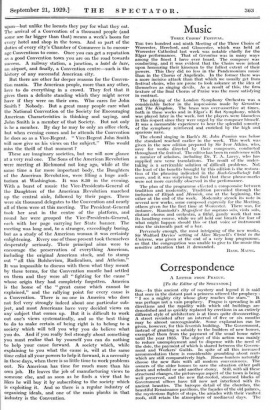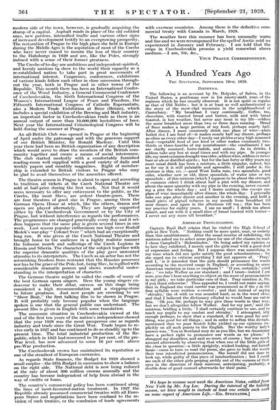Correspondence
A LETTER FROM PRAGUE.
[To the Editor of the SPECTATOR.] SIR,—In this ancient city of mystery and legend it is said that once in the distant past a princess uttered the prophecy : " I see a mighty city whose glory reaches the stars." It was perhaps not a vain prophecy. Prague is spreading in all directions and the rapidity with which old buildings are demolished and as quickly replaced by erections in an entirely different style of architecture is at times quite disconcerting. A street revisited after an interval of five or six months may be almost unrecognizable. Sonic explanation can be given, however, for this feverish building. The Government, instead of granting a subsidy to the builders of new houses, exempted them from the payment of the usual house rates until the year 1935. The object of this action was mainly to reduce unemployment and to dispense with the need of the dole, the payment of which is shared between the Govern- ment and Workers' Guilds. In spite of all this increased accommodation there is considerable grumbling about rents which are still comparatively high. House-hunters naturally choose the new flats with all modern conveniences. The owners of the older houses to save the situation either pull down and rebuild or add another storey. Still, with all these structural changes, the picturesque aspect of the town is being well preserved, and the new flat-roofed, stuccoed blocks of Government offices have till now not interfered with its ancient beauties. The baroque detail of the churches, the beautiful Renaissance pavilions, the façades of the old palaces, the mysterious flights of steps, the arcades with their vaulted roofs, still retain the atmosphere of mediaeval days. The modern side of the town, however, is gradually acquiring the stamp of a capital. Asphalt roads in place' of the old cobbled ones, new gardens, intensified traffic and various other signs of increased development testify to an evergrowing prosperity. The restoration of Prague to the high place she held in Europe. during the Middle Ages is the aspiration of most of the Czechs who have never ceased to mourn' the loss of their country to the Habsburgs in 1620 and are, like the Poles, strongly imbued with a sense of their former greatness.
The Czechs of to-day are ambitious and independent-spirited, and keenly anxious ti show to the world their capacity as a
re-established nation tfi take part in at movements of international interest. Congresses, conferences, exhibitions of various kinds follow each other in close succession through- out the year, both in Prague and in other towns of the Republic. This month there has been an International Confer- ence of the Wood Industry, a General Commercial Conference of Czechoslovakia, the Sixth International Congress of the Women's International League of Peace and Freedom, the Fifteenth International Congress of Catholic Esperantists, also a Modern Trade Exhibition at Brno (Briinn), which includes a special exhibition of the Brewing and Malt industry, an important factor in Czechoslovakian trade as there is an annual output of more than 10,000,000 hectolitres of beer. Next year the International Criminological Congress will be held during the summer at Prague.
An all-British Club was opened in Prague at the beginning of April under the patronage and with the generous support of our British Minister, Sir Ronald Macleay. Until this year there had been no British organization of any description which would serve to draw the members of the British com- munity together and create a means of social intercourse. The club started modestly with a comfortably furnished reading-room well supplied with a good variety of daily and weekly papers and monthly magazines. Right of member- ship is extended to British visitors to Prague who may be glad to avail themselves of the amenities offered.
The theatre season in Prague is about to open and according to tradition all tickets at the Czech National Theatre are sold at half-price during the first week. Not that it would seem necessary to offer any enticement to the public, as the Czechs, like most Slays, are ardent theatre-goers. There are four theatres of good size in Prague, among them the German Opera House at which, like the others, drama and opera are played alternately. They are largely supported either by the Czechoslovak Government or by the City of Prague, but without interference as regards the performances. The programmes are changed practically every day and it sel- dom happens that the same play is given several times in one week. Last season popular enthusiasm ran high over Rudolf Medek's war-play " Colonel Svee " which had an exceptionally
long run. It was given at the Czech National Theatre and
brought home to the audience in a highly realistic manner the toilsome march and sufferings of the Czech Legions in Russia and Siberia. The character of the subject together with the superior dramatic qualities of the play gave unwonted stimulus to its interpreters. The Czech as an actor has not the astonishing freedom from restraint that the Russian possesses nor has he the grace of the Pole, but, being Slav, he is gifted with considerable dramatic powers and shows wonderful under- standing in the interpretation of character.
The German theatre might be called the cradle of many of the best German opera singers. Here the young singers en-
deavour to make their debut, success on this stage being
considered a high recommendation and a stepping-stone to future greatness. Just now people are crowding to see " Show Boat," the first talking film to be shown in Prague. It will probably only become popular when the language spoken is one that the general public can understand. The present film is given in English with some translation.
The economic situation in Czechoslovakia viewed at the end of the first ten years of the nation's independence showed that the year 1928 was the most prosperous one as regards industry and trade since the Great War. Trade began to re- vive early in 1927 and has continued to do so steadily up to the present time. The total industrial production of the Re- public, which in 1925 had recovered to 79 per cent. of the pre- War level, has now advanced to some 10 per cent. above pre-War production.
The Czechoslovak crown has maintained its reputation as one of the steadiest of European currencies.
As regards State finances, the Budget for 1929 showed a small surplus—the fifth Budget in succession to show a balance on the right side. The National debt is now being reduced at the rate of about 500 million crowns annually and the country has become independent of help from abroad in the way of credits or loans.
The country's commercial policy has been continued along the lines of mcist-favoured-nation treatment. In 1927 the Republic already possessed commercial treaties with all Euro- pean States and negotiations have been confined to the re- vision of such treaties, or the conclusion of trade agreements
with overseas countries. Among these is the definitive com- mercial treaty with Canada in March, 1928.
The weather here this summer has been unusually warm and fine and we were recompensed for the spell of Arctic cold we experienced in January and February. I am told that the crops in Czechoslovakia promise a yield somewhat above
medium.—I am, Sir, &c., . _ _
YOUR PRAGUE .CORRESPONDENT.













































 Previous page
Previous page